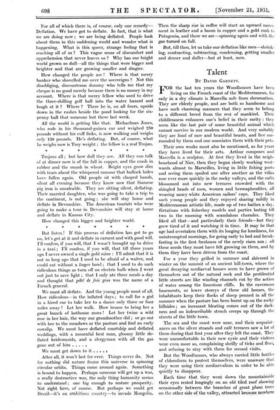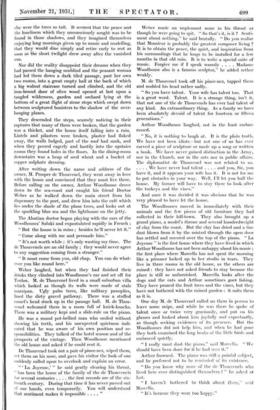Talent
BY DAVID GARNETT.
FOR the last ten years the Woodhouses have been living on the French coast of the Mediterranean, for only in a dry climate is Marcella safe from rheumatism. They are elderly people, and are both so handsome and have such charming manners that they seem to belong to a different breed from the rest of mankind. Their childlessness enhances one's belief in their rarity : they seem like the last, pair of some beautiful animal which cannot survive in our modern world. And very suitably they are fond of rare and beautiful beasts, and live sur- rounded by them and one associates them with their pets.
Their own works must also be mentioned, as for years they have lived for their arts.. Arthur composes and Marcella is a sculptor. At first they lived in the neigh- bourhood of Nice, then they began slowly working west- wards almost to Marseilles, living in little fishing ports and seeing them spoiled one after another as the villas rose ever more quickly in, the rocky valleys, and the cafes blossomed out into new terraces crowded with the shingled heads of men, women and hermaphrodites, all wearing saucy white American sailors' caps. They liked such young people and they enjoyed sharing mildly in Mediterranean artistic life, made up of two bathes a day, flirtations with fisherboy models and parties lasting till two in the morning with scandalous charades. They liked all that—and particularly their friends—but they grew tired of it and watching it in time. It may be that age had overtaken them with its longing for loneliness, for uninterrupted mornings, for going early to bed and break- fasting in the first: freshness of the newly risen sun ; all these needs they must have felt growing on them, and by them they have been driven from the coast.
For a year they grilled in summer and shivered in winter on the summit of an ancient hill-town, where the great decaying mediaeval houses seem to have grown of themselves out of the natural rock and the pestilential little streets are like winding channels cut by the action of water among the limestone cliffs. In the cavernous basements, or lower storeys of these old- houses, the inhabitants keep their flocks of sheep penned in all the summer when the pasture has been burnt up on the rocky hillsides ; an incessant bleating , comes out of the darkr ness and an indescribable stench creeps up through the streets of the little town.
The sea and the coast were near, and their acquaint- ances on the silver strands and café terraces saw a lot of them during that first year after they left the coast, They were uncomfortable in their new eyrie and their visitors were even more so, complaining shrilly of ticks and fleas; and refusing to stay with them for second visits.
But the Woodhouses, who always carried little bottles of chloroform to protect themselves, were unaware that they were using their mediaevalism in order to be able quietly to disappear.
Each time that they went down the mountainside their eyes rested longingly on an old tiled roof showing occasionally between the branches of great plane trees on the other side of the valley, attracted because-nowhere else were the trees so tall. It seemed that the peace and the loneliness which* they unconsciously sought was to be found in those shadows, and they imagined themselves enjoying long mornings given up to music and modelling, that they would dine simply and retire early to rest as soon as 141e Short twilight drew away after the vanished sun.
Nor did the reality disappoint their dreams when they had passed the hanging sunblind and the peasant woman had led them down a dark tiled passage, past her own two rooins, into a great empty hall at the back of which a big walnut ,staircase turned and climbed, and the old iron-bound door of olive wood opened at last upon a tangled wilderness, garden and orchard lying at the bottom of a great flight of stone steps which swept down between sculptured banisters to-the shadow of the over- hanging planes..
They descended the steps, scarcely noticing in their raptures that many of theriiwere broken, that the garden was a thicket; and the house itself falling into a ruin. Lintels and • pilasters were broken, plaster had flaked away, the walls bulged, part of the roof had sunk, and when they peered eagerly and hastily into the upstairs rooms they found holes in the floors. In the dining-room downstairs was a heap of seed wheat and a bucket of copper sulphate dressing.
After writing down the name and address of the owner, M. Prosper de Thouvenel, they went away in love with the house and convinced that they must live there. Before calling on the owner, Arthur Woodhouse drove down to the sea-coast and caught his friend Doctor Weber as he walked down the main street from his dispensary to the port, and drew him into the cafe which lies under the shade of the plane trees, and looks out at the sparkling blue sea and the lighthouse on the jetty.
The Alsatian doctor began playing with the ears of the Woodhouses' Saluki and expostulated rapidly in French : " But the house is in ruins ; besides he'll never let it." " Come along with me and persuade him."
" It's not worth while ; it's only wasting my time. The de Thouvenels are an old family ; they would never agree to any suggestion coming from a stranger."
" It must come from you, old chap. You can do what- ever you like round here."
Weber laughed, but when they had finished their drinks they climbed into Woodhouse's car and set off for Toulon. M. de Thouvenel lived in a small suburban villa which looked as though its walls were made of stale marzipan. Ugly palm 'trees, like military panoplies, lined the dirty gravel pathway. There was a stuffed camel's head stuck up in the passage hall. M. de Thou- vend welcon]kd them in a room full of knick-knacks. There wa,s a military kepi and a slide-rule on the piano.
He was a round pot-bellied man who smiled without showing his teeth, and his unexpected quietness indi- cated that he was aware of his own position and re- sponsibilities. They talked of the hotel season and of the prospects of the vintage. Then Woodhouse mentioned the old house and asked if he could rent it.
De Thouvenel took out a pair of pince-nez, wiped them, set them on his nose, and gave his visitor the look of one suddenly called upon to overlook-and explain an error.
" ' La Joyeuse,' " he said gently clearing his throat, " has been the home of the family of the de Thouvenels for several centuries : . the first records are of the six- teenth century.* During that time it has never passed out of our hands, even temporarily. You will Understand that sentiment tnakes' it impossible . . Weber made an unpleasant noise in his throat as though he were going to spit. " So that's it, is it ? Senti- ment about nothing," he said brutally. " Do you realise that Monsieur is probably the greatest composer living ? It is to obtain the peace, the quiet, and inspiration from his surroundings that he longs to be installed for a few months in that old ruin. It is to write a specialsiiite of music. Forgive me if I speak warmly . . . Madame Woodhouse also is a famous sculptor," he added rather weakly.
M. de Thouvenel took off his pince-nez, tapped them and nodded his head rather sadly.
" So you have talent. Your wife has talent too. That is a great word. Talent. It is a strange thing, isn't it; that not one of the de Thouvenels has ever had talent of any kind. An extraordinary thing. As a family we have been absolutely devoid of talent for fourteen or fifteen generations."
Arthur Woodhouse laughed, not in the least embar- rassed.
" No, it is nothing to laugh at. It is the plain truth. We have not been idiots—but not one of us has ever carved a piece of sculpture or made up a song or written a book. We have never gained distinction in the Army, nor in the Church, nor in the arts nor in public affairs. The diplomatist de Thouvenel was not related to us. . . . . We have never had talent . . . . and you, Sir, you have it, and it appears your wife has it. It is not for me to put obstacles in your way. Well, I'll let you half the house. My farmer will have to stay there to look after the turkeys and the vines."
And once it was decided it was obvious that he was very pleased to have let the house.
The Woodhouses moved in immediately with their animals and the few pieces of old furniture they had collected in their hill-town. They also brought up a grand piano, a model's throne and several hundredweight of clay from the coast. But the clay has dried and a fine dust blown from it by the mistral through the open door has settled and covered over the top of the piano. " La Joyeuse " is the first house where they have lived in which Arthur Woodhouse has not been unhappy about his music ; the first place where Marcella has not spent the morning like a prisoner locked up in her studio in tears. They live in three rooms in the old house, as the others are ruined : they have not asked friends to stay because the place is still so unfurnished. Marcella looks after the dogs and the cats and Arthur sometimes goes fishing. They have pruned the fruit trees and the vines, but they have not bothered with the ruined garden : it suits them as it is.
One day M. de Thouvenel called on them in person to leave some snipe, and while he was there he spoke of talent once or twice very graciously, and put on his glasses and looked about him joyfully and expectantly, as though seeking evidences of its presence. But the Woodhouses did not help him, and when he had gone they both examined the long beaks of the little birds and embraced quietly.
" I really must dust the piano," said Marcella. " We should have been done for if he had seen it." - Arthur frowned. The piano was still a painful subject, and he preferred not to be reminded of its existence.
" Do you know why none of the de Thouvenels who lived here ever distinguished themselves Y " he asked at last.
" I haven't bothered to think about them," ' said Marcella.
" It's because they were too happy."

































































 Previous page
Previous page